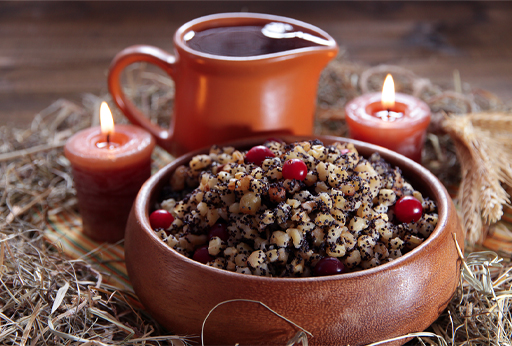5 Ukrainian Christmas magic
Ukrainian Christmas will surprise you a lot! Orthodox and Greek Catholic Ukrainians celebrate Christmas on 7 January, with Christmas Eve on 6 January. Since 2017 both 7 January and 25 December for Roman Catholic and Protestant celebrations are public holidays.
Christmas Eve – Sviatvechir (literally ‘Holy Evening’) – is the most important family gathering during the year. It is said that if someone is not at home on this evening, he or she will be away from home for a whole year. Ukrainian Christmas traditions have strong pre-Christian roots, as well as Christian interpretations. Ukrainians have a special meal which consists of 12 dishes. The number 12 represents the number of months in a year and the number of apostles. Traditional Ukrainian Christmas Eve meal consists of vegetarian dishes and fish. Two important dishes are kutia and uzvar. Kutia is a grain pudding, made from the finest ingredients of the previous year’s harvest with poppy seeds, nuts and honey. It is one of the most ancient dishes and it is cooked to commemorate the dead. Uzvar is made of dried fruits: dried apples, pears, raisins etc. with honey. Other dishes served are borshch, varenyky (stuffed dumplings), cabbage, potatoes, fish, beans and sweet bread / donuts.

In villages people put hay on table under a tablecloth, which symbolises hay on which Jesus was born, as well as under the table, to symbolise hay for cattle.
Apart from Christmas trees, used in other European countries, Ukrainians have an ancient Christmas symbol – didukh. It is a bunch of wheat which symbolizes welfare, harvest and spirit of ancestors.

Children try to visit their godparents this evening, if they live nearby, or in coming days. They greet them and receive presents.
Ukrainians greet each other during Christmas time with words Христос народився! – Славімо Його! (Khrystos narovyvsia! – Slavimo Yoho!) which means ‘Christ Is Born! – Let us glorify Him!’.
A lot of Ukrainians attend church services and sing carols at Christmas. Children and young people frequently perform a vertep – a Nativity play, which often includes two parts: one telling the Christmas story and the other portraying scenes from everyday life relating to recent events in society or the country.
Christmas lasts till 19 January. Two other important dates include 13–14 and 18–19 January. 14 January is called Old New Year, and the evening of 13 January is Old New Year’s Eve. This evening, people cook a rich supper (if they are not completely exhausted with celebrations yet and have enough time for this after work).
On 19 January Orthodox and Greek Catholic Churches celebrate Theophany, when Jesus was baptised in the river Jordan, and 18 January is a day of fasting with an evening meal similar to the one of Christmas Eve. The name Shchedryi vechir (which means ‘generous evening’) is used in most parts of Ukraine for Old New Year Eve, 13 January. In Western Ukraine, this name is used to denote the evening of Theophany – 18 January. Shchedryi Vechir gave its name to the pre-Christian New Year's carol Shchedryk, which is about a swallow heralding the spring. In its arrangement by the Ukrainian composer Mykola Leontovych the song was performed, in the early twentieth century, during a world tour by the Koshyts Ukrainian choir. A western composer used this melody, adding English lyrics, to produce the ‘Carol of the Bells’, which is now well known in the UK and worldwide.
